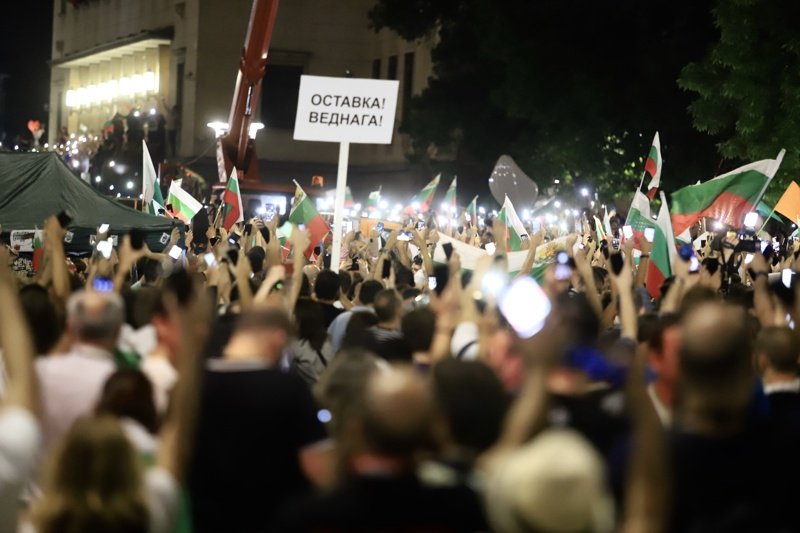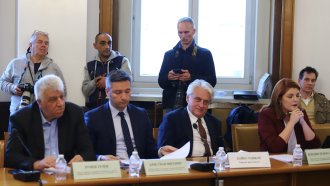Thousands of Bulgarians gathered in the morning of September 10 on the streets of Sofia for what was the 64th day of nation-wide anti-government anti-corruption protests in Bulgaria. The protest on the 10th was organized under the under the slogan Second National Uprising. People began gathering at 8 AM in front of the Parliament building in Sofia. The demonstrations lasted throughout the day and well into the night. The "First National Uprising" protest was on September 2, the first day Parliament held a sitting after summer break. The daily protests, since they began over three months ago, attract thousands daily. But the attendance in the two "national uprisings" was meant to exceed regular attendance by a landslide, which both events achieved.
For more than three months now protesters across the country demand PM Boyko Borissov’s resignation daly, along with his government’s and Prosecutor General Ivan Gehsev’s for deep rooted corruption, ties and dependencies between this government and oligarch business interests, and an overall concentration of power — practically impenetrable after Borissov’s party has been in power for more than a decade, with a short intermission of two years.
Borissov categorically refuses to resign and has tried over these past months to shift the public’s attention elsewhere. But these attempts not only have failed but often have had the opposite result. The most notable, larger than life, endeavor to that effect was, instead of stepping down, to table a new constitution to Parliament. This of course only fueled protests further, but I did buy the PM time to remain in office little longer.
The day leading up to the National Uprising 2, Borissov said "the mafia is on the streets, they want us to resign", referring to protesters. The choice of words is hardly coincidence: Maybe the most often heard chant by protesters during the anti-government demonstrations is precisely "Mafia out", seeing as thе chief accusation from the street is the apparent symbiosis between the executive branch, the Prosecutor’s Office, several "anti-corruption" agencies, on the one hand, and certain protected business elites, on the other.
Another popular theme among protesters has been the apparent unwillingness of the EU to take a side or speak out on the democratic crisis in the country.
While Borissov could count on the European Union not to intervene much or indeed criticize his government until recently, this seems to no longer be the case.
Over the past week prominent members of the European Commission and the European Parliament have spoken openly and rather harshly regarding the events in Bulgaria and the alarming determination of this government and its Prime Minister to do whatever it takes to hold on to power.
Yesterday the deputy chair of the European Commission Vera Yourgova spoke to the European Parliament about the long-standing problems regarding the unaccountability of the Prosecutor General in Bulgaria as well as about the rapid decline in media freedom over the past decade in the country.
Till now the commission has acknowledged on countless occasions through various mechanisms and reports that the Bulgarian judicial system is in desperate need of reform especially in terms of the figure of the Prosecutor General and the Prosecutor’s Office. The latter two still carry the fundamental design of the prosecution in the totalitarian states. The power of the Prosecutor General in Bulgaria by law is virtually limitless, its actions and decisions entirely its own and with no mechanism to be verified or accounted for by any other power or institution. However, the criticism about lack of reform within these crucial systems for a democracy has not produced much practical actions apart from recommendations and reports themselves. Now it seems the European institutions might finally take a harsher stand regarding these issues in Bulgaria.
The Bulgarian MEP Elena Yoncheva, a former journalist and member of Borissov’s parliamentary opposition the Bulgarian Socialist Party, and an outspoken critic against Borissov’s government, announced in an interview for bTV that the European Parliament will hold a special sitting dedicated to the situation in Bulgaria. The debates will be held in early October and will, according to Yoncheva, conclude with a special resolution. In her words such settings are convened would only if a country is in a very deep crisis. She compared the tendency in Bulgaria with Belarus "because we have an authoritarian regime".
At the same time the MEP from GERB and the European People’s Party Andrey Novakov dismissed the European Parliament‘s plan to hold a special debate about the rule of law in Bulgaria as trivial. According to him such debates are on held all the time, for all countries and on an array of subjects, and there is nothing special about this one.
As much as Borissov and his party try to ignore the protests, first, there is no indication they will be calming anytime soon - if anything, the contrary - but second, the largest pro-democratic demonstrations in Bulgaria in the last seven years, have been attracting increasing attention from Western media. The mounting reports in a number of prominent foreign news outlets arguably pushed the EU to speak up and act as well. As the media is continuing to highlight the crisis, the pressure on institutional action will also increase, which, with each passing day, further inflates the question why is holding on to power Borrisov’s only priority, how far is he willing to go to achieve this goal, and what kind of leader does that make him.
Ключови думи
За честна и независима журналистика
Ще се радваме, ако ни подкрепите, за да може и занапред да разчитате на независима, професионална и честна информационно - аналитична медия.
 2 коментара
2 коментара
Екипът на Mediapool Ви уведомява, че администраторите на форума ще премахват всички мнения, съдържащи нецензурни квалификации, обиди на расова, етническа или верска основа.
Редакцията не носи отговорност за мненията, качени в Mediapool.bg от потребителите.
Коментирането под статии изисква потребителят да спазва правилата за участие във форумите на Mediapool.bg
Прочетете нашите правила за участие във форумите.
За да коментирате, трябва да влезете в профила си. Ако нямате профил, можете да се регистрирате.





Failure! Failure! Failure! The Bulgarian government has failed it's people in every single sector! This is corrupt mafia country ran by oligarchs!
The Bulgarian government is a right wing elite CAPITALIST government! As a all right wing elite CAPITALIST governments it fails to meet the needs of the people! No surprise to me! Expecting a CAPITALIST leader to do his or her job is like expecting a donkey to be a camel! 30 years ago Bulgaria was allot more advanced than it is today, even with all it's shortcomings and lack of democracy! Even 20 years ago Bulgaria was allot better than it was today! Everything has been destroyed and privatized …
out of greed by this government and the previous governments including HEALTHCARE, RAILWAYS, STATE OWNED FACTORIES, EDUCATION, ENVIORNMENT, THE BLACK SEA COAST... and many other sectors. The corruption is so rampant its not even a joke. The Bulgarian people deserve better! May God protect Bulgaria, because no one else can!